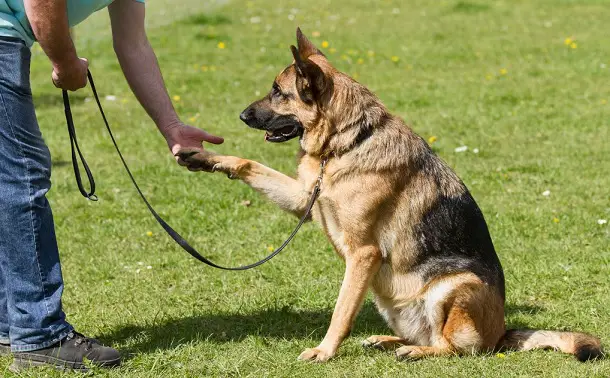German Shepherds occupy an honorable place in the ranking of the smartest dog breeds. However, even such clever girls, if you do not pay attention to their upbringing and training from an early age, can turn into real monsters, terrifying not only strangers but also members of their family.
German Shepherd Puppy Training

The age from which the “Germans” are quite ready to train serious teams is considered to be 6 months, but this does not mean that the puppy does not need to be brought up until that time. From the first days of being in his new home, the little shepherd should realize that the owner of the house is a man, and not he. The new family member needs to be shown where his food bowl is, where he should sleep. Particular attention must be paid to learning the name. The puppy must remember his name and respond as soon as he hears his name.
Important! It is best to conduct training in a playful way.
Professionals advise adhering to this scheme:
At 1.5-2 months, a relationship is established between the pet and its owner. The dog is taught to maintain cleanliness in the house, begin to teach the elementary commands “Place!”, “Come to me!”. It is too early to demand obedience from a puppy at this age.
In the period from 2 to 4 months, the puppy is taught to fulfill the commands they have mastered. Also, during this period, the dog is already taken out for a walk, and for this, it is taught to walk on a leash attached to the collar. Outdoor training and toilet training begins.
After the shepherd is 4 months old and up to six months she is taught the commands “Stand!”, “Sit!”, “Lie!” and “Don’t” Particular attention is paid to endurance, which is not so much of a German teenager.
Starting from 6 months, the shepherd continues to be taught the correct behavior and socialization. You can start to master such commands as “Voice!”, “Bite!” “Fetch!” It is difficult to teach a dog protective skills at home; there are special courses for this.
Do not overload little shepherd dogs and tire them with long-term activities. Babies who have not yet turned 2 months old will lose interest in the lesson after 3 minutes. The duration must be increased gradually, bringing it up to 30 minutes by six months. After the shepherd is 6 months old, she is already quite capable of withstanding an hour’s lesson, after a year they spend 2 hours a day on training.
What Can You Train Your German Shepherd?
“Germans” are recognized as the most versatile breed. They can easily master almost any special education course. So, from this shepherd dog, you can make a detective or guard duty worker. In addition, German shepherds are used in the army and police. These dogs are of particular value as participants in rescue and search operations, as guides for blind people and people with disabilities. Shepherd dogs also demonstrate excellent results in sports doing agility or triathlon.
Important! Special training is provided by a professional instructor only.
Parenting Rules
To train a German to give positive results, you must adhere to the following rules:
You need to start with simple ones, gradually moving on to more complex commands.
At the very beginning of training, together with the command, it is necessary to pronounce the name of the dog. This will help get the puppy’s attention.
With a raising of the voice, it is necessary to pronounce only forbidding commands. Everything else is spoken in a neutral tone.
You cannot distort and change words in commands that are identical in meaning. So, for example, if you always said “You can’t!” there is no need to say “Don’t” to the dog, she simply will not understand what they want from her.
During classes, commands need to be alternated.
You need to start learning new things only after the previous lessons have been mastered 100%.
Don’t forget about rewards. You need to praise the dog both verbally and by treating it with treats (cookies, pieces of dry food).
Punishing the dog is also necessary, but the use of physical force is strictly prohibited.
Important! The same person should be engaged in the education and training of the dog. It is advisable to draw up a schedule of classes and strictly follow it.
Sometimes the owner may notice that the classes do not bring any results. In this case, it is necessary to analyze the situation. Perhaps the training is lacking in consistency, or the classes are held in an inappropriate place. In any case, to deal with the problem and eliminate it, you can, most importantly, set a goal. A professional dog handler will be able to help with this.

